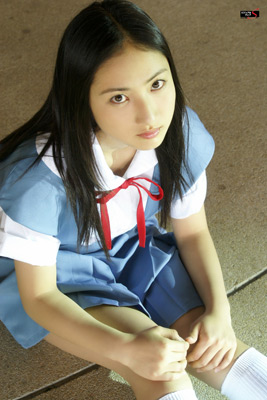Tokyo Government to pass tough ordinance against mature manga

The law doesn’t touch this
The Tokyo Metropolitan Government is set to pass new legislation restricting the sales of manga depicting certain sexual acts to minors under eighteen.
Contrary to what certain easily-excitable individuals may proclaim, this is not a ban and this is not the end of the anime. But it will certainly pose a huge problem to the industry.
Background
The proposed law has been working its way around the bureaucracy for months and started off as an anti-lolicon bill. A detailed guideline to classifying paedophilic content in manga was drafted by the person in charge, but this proposal was shot down for being too vague.
In the guideline, the author attempted to justify why certain scenes of nudity featuring minors (such as Doraemon‘s Shizuka Minamoto who loves to take baths) will fall outside the definition of child porn, but this was deemed to be too arbitrary by the committee who probably possessed enough mental capacity in their old age to realize that enforcing age restrictions against drawn cartoon characters is insane. The bill failed to muster enough support.
Months later, it was resurrected and rewritten to target depiction or glorification of sex acts that are illegal (e.g. rape) or immoral (e.g. incest which is not illegal in Japan), a criterion which was deemed to be much more enforceable and objective. This has the unfortunate side effect of making the law even more draconian than its original intention.
Yesterday, the Tokyo Metropolitan Assembly’s General Affairs Committee approved the bill by a large majority after a last-minute compromise between the conservative LDP (Liberal Democratic Party) proponents led by Tokyo Governor Shintarou Ishihara (who famously cracked down on Kabukichou) and the DPJ (Democratic Party of Japan, the less conservative national ruling party) assemblymen. The compromise requested by the DPJ was to include a clause giving exceptions to works that demonstrates “artistic merits”.
The LDP, DPJ and Komeito voted for the bill and only the Seikatsusha Network Mirai and the Japanese Communist Party (i.e. pretty fringe oppositions) voted against it over technical disagreements rather than principled ones. Having passed the General Affairs Committee, the bill is expected to be passed by the main assembly tomorrow, 15 Dec 10, despite uncharacteristically intense protests from the industry.

Her name is Reon Kadena
Tokyo Anime Fair
Due to Governor Ishihara’s uncompromising attitude against the anime and manga industry, he is perceived by some to be carrying out a personal vendetta by pushing for this bill.
In protest of this, ten major publishing companies led by Kadokawa, including Kodansha, Shueisha, Shogakukan, have withdrawn their participation from the upcoming Tokyo Anime Fair taking place in March next year. Collectively, they own the rights to a large portion of the popular current titles. Unless this boycott is called off, Tokyo Anime Fair 2011 will likely be cancelled or at least totally lame and pointless.
When asked for his opinions regarding the boycott by a reporter, Governor Isihhara (who is technically the chairperson of the TAF organising committee but seems to be totally disinterested in it) responded angrily and effectively told the companies to fuck off and do whatever they want.
And late last night, Prime Minister Naoto Kan, who is not involved in this prefecture-level legislation, included a short postscript in his blog post describing this as an issue concerning the “Japan Brand”. He covered his base by saying that protecting the youth is important, but goes on to emphasise that promoting anime is also important as part of Japan’s soft power. He appeals for the parties involved to ensure that it will be possible for Tokyo Anime Fair to continue to thrive in Tokyo. This is interpreted by some as a warning to Ishihara not to push the issue too far.

Saaya Irie
The Law
Information on the proposed ordinance itself is scant online because Japan as a nation is terrified of the Internet and refuses to post any useful information online. If someone can find the full Japanese text of the bill, please link me. (UPDATE: Refer to the bottom of the entry for the relevant text extracted from the actual bill.)
But from what I have gleamed from Japanese new sources, the proposed law seeks to restrict sales of anime and manga titles depicting or glorifying sex acts that are illegal or immoral. The two examples given by all the newspapers were rape and incest, but presumably this is not an exhaustive list.
It is interesting that the law specifically targets anime and manga instead of generic creative works. This lends credit to the suggestions of certain conservative agenda at work. Or perhaps otaku were simply deemed to be harmless weaklings who would not be able to resist, giving an easy brownie point for the moral crusaders.
Please also note that this is a Tokyo Metropolis bill being passed by the Tokyo Metropolitan (i.e. prefecture) government and not the Japanese national government situated in Tokyo, so if passed it will affect only the Tokyo area.
Effective Ban
This ordinance does not ban anything. Hardcore pornographic manga will still be legal as they have always been, because they already comply with the proposed 18+ restrictions.
However, there are many manga titles targeted at working adults that will be affected by the proposed law. Off the top of my head, I imagine titles such as Kiss x Sis, Gantz, Berserk and various yuri/yaoi titles will be faced with a dilemma.
The problem is that being classified as “18+” is a commercial kiss of death similar to the AO games rating in the US. Book stores will either not stock the books or place them in a corner designated for pornography. This will be a huge distribution, retail and advertising disadvantage for titles that are not porn but contain select scenes that fall under the new law.
Yes, hardcore ero-manga has its lucrative niche in the market. But if Berserk has to be sold next to actual porn in a hidden corner of the shop, then how can it hope to attract the attention of its intended audience: adults looking for edgy seinen manga? In the long run, this results in a chilling effect on the creative freedom in storytelling, since publishers will be unwilling to fund such works given the risk of being branded 18+ by the Tokyo government.
There are existing retail ordinance regulating the sales of porn and 18+ materials. I am not familiar with the exact intricacies, but I suspect that restricted advertising and physical isolation are probably among the guidelines.
Additionally, there are online speculations about whether titles like Ore no Imouto ga Konna ni Kawaii Wake ga Nai and Panty & Stocking with Garterbelt will be affected, but my feeling is that it won’t be that drastic, so don’t get your panties in a bunch just yet. Yosuga no Sora on the other hand…

Aki Hoshino
Opinion — Doujinshi
The enforcement of the law will presumably entail government bureaucrats spending all day reading manga and watching anime in order to decide which titles should be 18+ restricted.
This brings into question how doujinshi, being non-commercial and unfunded in nature, will be treated by the system. If right holders must submit their works for approval for an administrative fee, then this barrier of entry may effectively prevent doujinshi from being sold in retail stores in Tokyo.
This also makes me wonder about Comiket. From my experience, Comiket tries to group works of similar nature together (i.e. smut with smut) but this is not enforced strictly and in general the individual stalls lack any indication of whether their products are 18+ in nature (at least the ones where this is not immediately obvious).
I presume that Comiket has long been in violation of some kind of Tokyo ordinance governing sales of porn and the government was just sort of turning a blind eye on it. I was actually under 18 during my first trip to Comiket and there was no age limit of any kind being enforced. If the Tokyo government chooses to tighten its enforcement, I wonder what will happen.
Certainly, it will be extremely costly and difficult for the organising committee to implement any effective screening for doujinshi sold during Comiket, especially since many of them are finalized literally days before the event. At the same time, enforcing an age limit for half a million visitors will not be any less insane.
I wonder if there exist any venues outside of Tokyo with infrastructure capable of hosting Comiket should it come to that.

Saaya Irie
Opinion — Age Limit
I am a free speech guy. In general where possible, I prefer unrestrained expression and have argued this before. However, I agree that age restrictions can be necessary and effective. In this case, the problem does not lie so much with the intention the law, but rather in the implementation.
As adults, I think we can all agree that we want a level of entertainment that exists between teenage-oriented shounen titles and hardcore pornography. The problem with a 18+ or nothing rating system is that it makes it difficult to market such a product. Market it as 18+ and be relegated to obscurity or market it as all ages and get blamed when children buy it.
This problem is not new and the industry has always tried to side-step it through its own system of genre classifications. But there is no uniform guideline that informs consumers if a seinen title is unsuitable for the youth. This problem has long been solved by movies and video games, so it puzzles me why it continues to be a problem here despite being often brought up.
I suspect that this has something to do with the industry not wishing to spend more money on working out a age classification system. But I think it’s also because such age restrictions were never deemed necessary for novels and you can easily find explicit pornographic novels prominently displayed in any major Japanese book stores with no restrictions on them.
So, I think a more comprehensive gradient of age classifications will help to alleviate some of the political pressure being exerted on the industry. You can argue that children still get to play violent video games, but the point is for the industry to demonstrate that it has done its part.
Branding your own product 18+ is commercial suicide. But if a sensible classification system exists that allows adult-oriented entertainment to thrive while differentiating them from both shounen and porn titles, content owners may be more willing to classify their works properly, reducing the need for a clumsy bureaucracy to step in.

Yukie Kawamura
Opinion — Enforcement
I think one interesting food-for-thought for me personally is the enforcement process.
Manga is just drawn pictures. How do you prove that illegal or immoral acts are being portrayed or glorified? I’m sure it will be clear cut in many situations, but I can think of a lot of potential loopholes.
For example, you can prove incest in real-life through DNA test, but how will you do that in manga? What if the characters involved turn out to be not related by blood? What if they are not depicted as siblings at all, but the girl just likes to call the guy “onii-san”?
The other example used, rape, is similarly mind-boggling. How can fictional characters give consent? What constitutes manga rape? I can see plenty of room for contention if someone chooses to dispute a specific ruling.
Furthermore, are non-explicit yuri and yaoi manga “glorifying” immoral sexual behaviours? And, for that matter, will homosexuality be considered immoral? There are a lot of unanswered questions over which I cannot opine without a copy of the original legislative text. (Refer to UPDATE below for further information.)
Conclusion
This law will not be the end of manga and anime because Bleach, Naruto and One Piece will survive like how cockroaches will survive the nuclear holocaust. But it will probably make manga and anime a lot duller than they have to be, in the absence of a more sensible content classification guideline.
Given the number of manga titles being produced on a regular basis and the amount of bureaucracy that will probably be required to assess them using these highly subjective criteria, this law will inevitably add an invisible tax to an industry that is not exactly in its best days.
The most likely outcome is that future titles deemed to be pushing the vague lines drawn by the law will be canned by the publishers because of the undetermined risks involved. There will be a huge financial incentive for companies to self censor and err on the safe side. This will most probably achieve the conservatives’ intended effect of reining in the industry’s growing dependency on sexual titillation, but one wonders at what cost.
As the Papa Bear puts it, this fucking thing sucks.
P.S. I think my favourite comment on this whole situation comes from Diemeow23 in Sankaku Complex’s blog comments:
If this does get implemented then I’m glad I saw anime and manga at its most shining brilliance however perverted the light was
Update
I was linked to the legislative text in question (so Japan does do some things right :P). The relevant portion of the text that defines works targeted by the law:
第八条第一項第二号の東京都規則で定める基準 漫画、アニメーションその他の画像(実写を除く。)で、刑罰法規に触れる性交若しくは性交類似行為又は婚姻を禁止されている近親者間における性交若しくは性交類似行為を、不当に賛美し又は誇張するように、描写し又は表現することにより、青少年の性に関する健全な判断能力の形成を妨げ、青少年の健全な成長を阻害するおそれがあるもの
The criterion as defined by Rule 2, Paragraph 1, Article 8 of the Tokyo Metropolitan Law: Comics, animation and other images (excluding photographs) that improperly glorify or exaggerate, through their depiction or presentation of, acts of sexual intercourse that violate penal laws or sexual conducts or acts of sexual intercourse between close relatives who are legally prohibited from marriage, and as a result may be harmful to the wholesome development of young people and impede their ability to form healthy impressions about sex.
It appears that the law is not as far-reaching as suggested by initial reports. Since homosexuality is perfectly legal in Japan, this means that yuri and yaoi are safe for now. It’s funny how they have to propose a roundabout definition of incest since it is not actually an illegal act in Japan.
This explains why news outlets reported the law as targeting illegal and immoral sex acts — incest is technically not illegal. But it also means that other forms of “immoral” sex acts are not actually covered by the law so long as they are legal in themselves by the standards of the penal code. But it’s still amusing to have to judge the legality of actions committed by fictional drawings.
So, all in all, this issue seems to be worthy of protest and improvement but it is nowhere close to an end-game scenario for the industry, since most ecchi fanservice and softcore porn depicted in anime and manga are neither illegal (especially since the age of consent in Tokyo is 13, well below the age of most anime characters) nor incestuous.







December 14th, 2010 at 7:42 pm
Time to return to fapping to 3D… *sigh*
December 14th, 2010 at 9:13 pm
The whole artistic merit loophole could end up making the whole thing ineffectual, depending on what that actually might mean. The fact that people would pay for the stuff should mean that it has merit to them, right? :P
Anyway I suspect once the dust settles the only thing that will happen is Comiket forcing circles into smut/not smut areas/days and getting ID to enter the 18+ areas. Which will of course just make the material more alluring to teenagers since they’ve been told they can’t have it.
December 14th, 2010 at 9:52 pm
I’d think that given the wording that the bill is NOT more specific, but rather even more broad than ever before. It scrapped the “virtual youth” and “implied age” language in favor of simply targeting “virtual [sex] crimes”. That can extend to a range far beyond the original scope of the bill, and even farther beyond what the TMG can already regulate with its existing powers.
Bill 156 doesn’t actually add any new powers to the TMG’s suite but rather widens said powers’ coverage. That’s almost as bad as a blanket ban, especially since all of this is ultimately subject to the individuals in whatever committee is placed in charge of deeming what “unjustifiably glorifies and exaggerates” the now-many criteria available to judge.
And to engage in some Ad Hominem, one must consider the attitudes displayed so far by some of its primary proponents. Homosexuality isn’t illegal, certainly, but surely, if a committee member decides that the “casual appearance” of homosexuals in the mass media is already a negative thing, perhaps a yuri/yaoi manga depicting a intense homosexual relationship would be “far too exaggerated” than what would be appropriate for Japan to experience, lest it be tainted further by those filthy gays.
December 14th, 2010 at 10:27 pm
NegativeZero: Having been to Comiket, I believe that IDing people is completely unworkable. The human traffic is insanely slow as it is.
praestilyn: It is true that the new bill is worse than the old one. But you have to admit that it is more logically consistent. There is no longer a need for an arbitrary explanation to explain why some scenes of (apparent) under-age nudity are acceptable whereas others are not.
The problem I see with your argument is that a homosexual act is neither illegal nor incestuous, therefore the clause about “too exaggerated” should not even begin to apply to it. I agree with you that the law grants a lot of subjective discretion to the enforcers, but this seems to be a pretty clear-cut situation.
The real potential for abuse in my opinion comes from challenging the legality of sex acts, whether homosexual or otherwise, using obscure laws such as ones involving public obscenity (i.e. will consensual sex acts taking place outdoors fall under this?) Furthermore, works of fantasy fiction set in different era/planet/universe may make interpreting the abstract legality of the actions depicted very difficult.
December 14th, 2010 at 11:06 pm
I recommend people read Kanemitsu Dan’s blog (http://dankanemitsu.wordpress.com/). He has already written some extensive analysis about this bill (and was even a panelist at the discussion about it’s repercussion a few days ago), and it’s a very good source of information for people who aren’t as wieldy with Japanese.
The doujin angle you mentioned is very interesting. My opinion is that nothing will change about Comiket, at least for now – as you mentioned, currently there is no feasible way to enforce anything on an event of that scale, short of canceling it, and TMG is already having their hands full with industry resistance, so provoking the public even more is not in their best interest. Unless they try to use “lowly otaku” as an example to threaten back the industry, that is. But I don’t think it will come to that.
December 14th, 2010 at 11:10 pm
Gantz!? Ohhhh now they’ve gone and done it!
December 15th, 2010 at 12:57 am
Diemeow23 said it. It probably won’t affect the industry as much as people are fearing it will. At least I hope it doesn’t
December 15th, 2010 at 8:28 am
This is well explained since there is a lot of flak going on in the blogosphere with the bill being a apocalypse for the industry… They may have good intentions, but the execution is not good. Plus, it is a government’s job to control the media. Sure, there are some titles that have immoral stuff, but most of them are not a big deal.
If they are going to make a bill, make it clear and be transparent about it. I’m sure the lack of transparency is also a big problem why the bill is unpopular towards the citizens.
Trackback from
Tokio rajoittaa “haitallisen erotiikan” myymistä - Anime-lehtiDecember 15th, 2010 at 9:30 am
[...] (ANN (1, 2), Ramblings of DarkMirage) [...]
December 15th, 2010 at 9:43 am
You forgot to mention 青少年に対し、性的感情を刺激し、残虐性を増徴し、又は自殺若しくは犯罪を誘発し、青少年の健全な成長を阻 害するおそれがあるもの which this bill also covers. This is what will ruin shonen and seinen series.
December 15th, 2010 at 10:21 am
Don, the quoted part is what is new in the ordinance, which is a modification to an existing law.
The part you point out is an existing part of Tokyo law, which apparently has not killed off anime yet.
December 15th, 2010 at 1:06 pm
My heart goes out to the prosecutors in the 東京地検. As if they don’t already have enough work to do prosecuting chikans and embezzlers.
Someone should really consider the cost of enforcement when writing new laws or ordinances. Inconsistent enforcement brings disrepute to the law and the justice system, but consistent, indepth enforcement reeks of totalitarian control.
Anyway I am sure the cops have plenty of time to go around raiding, but Japan doesn’t have enough prosecutors or judges to handle those cases with the rigour any criminal case deserves. Irresponsible legislating should really be a crime.
December 16th, 2010 at 10:25 am
Many thanks for the clear explanation of what’s going on. Sankaku has blown this thing up far beyond the truth, so I was really running out of reliable sources to get good information. What I really fear from this bill is not the actual enforcement of the bill’s provisions, but from the fact that it might strike a lot more fear into the hearts of the industry and cause them to shut down a lot of ideas that would otherwise be turned into anime. I mean if this bill was around before, I get the feeling that Gainax might have shut down Pansuto before the idea even left the drawing boards. That’s now my greatest fear concerning this bill, and I think it’ll just come down to how the industry takes the provisions. I think the effects on the manga industry will be rather immediate, but we won’t see any effects on the anime industry until we get further down the road.
Considering that some mangaka have already expressed their concern over the bill and possible cancellations, we’ll probably quickly see the stifling of any new talent to enter the scene.
December 16th, 2010 at 11:52 am
What ever it is, the fact that this bill has absolutely no benefits to anything, economy and “protecting the minds of the children” makes me wonder what kind of dumb f**ks are running the government of Japan… I guess thats why Tabata wrote Akumetsu.
Trackback from
What The World Needs Now: Bill 156 & What We Should Do « Eye SedsoDecember 16th, 2010 at 12:31 pm
[...] to sum this up, everyone’s too God damn sensitive. And after reading THIS POST, I’ve really gotten mad. First, here’s [...]
Trackback from
Thoughts about Bill 156 and Why the Law is Censoring like it’s 1984. | Chikorita157's Anime BlogDecember 18th, 2010 at 10:30 am
[...] I share my opinions, what is the bill supposed to be? In the translation of the bill provided by DarkMirage, shows something like this: The criterion as defined by Rule 2, Paragraph 1, Article 8 of the Tokyo [...]
Trackback from
Bakacast – My Motorcycle Can’t Be This Sexy « Project HaruhiDecember 21st, 2010 at 2:34 pm
[...] of Hasbro's new TV shows, Transformers: Prime. But before that, we all discuss the details of the content-restriction bill that the Tokyo Metropolitan Government passed recently, also known as the "anime ban." Not because [...]
Trackback from
Mr. Ishihara or How I learned to stop worrying and love Bill 156 « Blue Blue WaveDecember 22nd, 2010 at 3:01 am
[...] voices have more eloquently responded, interesting articles by Ramblings of a Dark Mirage, Behind The Nihon Review and Dan Kanemitsu come to mind. A common thread with those is that there [...]
Trackback from
In memory of 2010 finale: the anime/game/manga industry vs. the Tokyo Government « HOT CHOCOLATE IN A BOWLJanuary 5th, 2011 at 8:08 am
[...] Dark Mirage’s post and comments here amounts to the most sensible analysis of the situation I’ve found so far. For the three [...]
January 6th, 2011 at 5:09 am
It’s just another bad case of the wrong types of people taking charge in regards to the issue of responsibility.
I did post some thoughts on what the law says about certain people. You can read it at: http://www.mangatherapy.com/post/2609971604/youth-ordinance-bill
With the manga publishers fighting the law to a huge degree, we might experience a huge shift in how Japan progresses in the future.
Trackback from
On the Tokyo Youth Ordinance (Bill 156) « HOT CHOCOLATE IN A BOWLJanuary 6th, 2011 at 3:18 pm
[...] Tokyo Government to pass tough ordinance against mature manga, by Dark Mirage. [...]
Trackback from
An Overview of Japanese Censorship and Obscenity Law at Otaku, No VideoJanuary 25th, 2011 at 12:27 am
[...] of the Tokyo Youth Ordinance Bill amendment sparked a lot of blog posts. But what’s the actual state of Japanese obscenity law? Robert Clyde Allen [...]